
One Week in Morocco: Sahara & Todra Gorge Itinerary
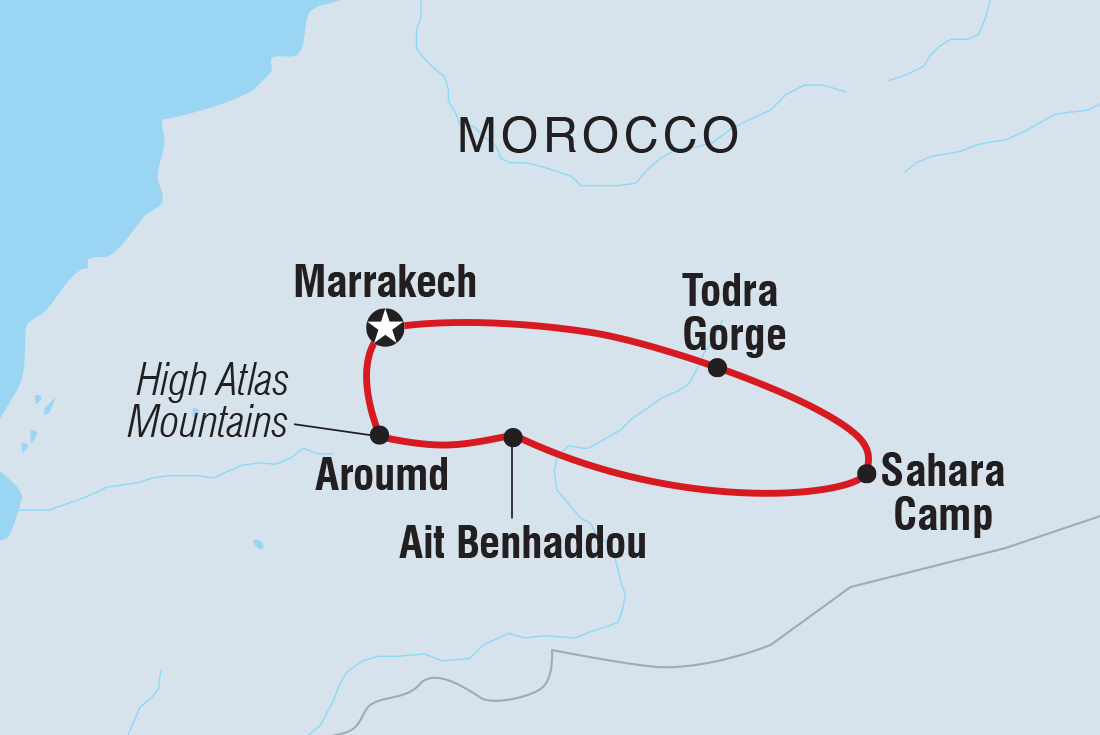


Salaam Alaikum! Welcome to Morocco. This adventure begins with an important welcome meeting at 6 pm at your hotel. After meeting your fellow travellers and the group leader, why not get to know each other while exploring the city’s main square – Djemaa el-Fna – or get lost exploring the city’s spice souks or bazaars. For dinner, maybe load up on some delicious street food, but be warned – the eggplant fritters are addictive and the barbeque smells around the city will be sure to make you hungry (even if you’ve just eaten!). Marrakech is also known as a great spot for trendy rooftop bars, so why not head to one of the local favourites with a view and grab a cocktail.
After breakfast, you’ll make your way to Todra Gorge. This is a long travel day, so make sure you have a book handy. After a while, you’ll come across a bright tablecloth of green that might seem so out of place, you'll think you’re dreaming. This valley is pretty impressive, with all its palm trees and mud-brick villages. Arrive at your hotel at the top of the valley, and take some time to relax, recharge and chill out under the palms. Maybe head out for a brief stroll before enjoying an included dinner with your group. Settle in for the night and get a good night’s rest, ready for a beautiful hike tomorrow.
After breakfast, take a hike through the shaded palms of the Todra Valley for a couple of hours, taking in the picturesque scenery of the gorge ahead. Be rewarded at the end of your adventure with a home-cooked lunch served in the backyard of a local family. You'll be treated to dates, nuts, tea and a delicious meal to refuel after your walk. Then, make your way to the Sahara. After a few hours of transit, get ready for a once-in-a-lifetime experience in a sun-kissed desert. The mode of transport? Camel, of course! Brace yourself for one heck of a sunset while you wind through the vast expanse of sand and loop back to your private camp for an overnight stay in the middle of the sandy dunes. In the camp, you'll have a thin mattress, blankets and sheets (and an auberge not so far away, just in case). Ensure you bring a sleeping sheet and warm jumper if it's winter (you'd be surprised how cold it can get). Sleep under the stars and have a mind-blowing 'I am so far from home' kind of moment.
Remember to set your alarm this morning because you'll get up well before dawn. Climb a nearby sand dune to catch the sunrise – this sight is worth the early rise – then head back to camp for breakfast, collect the rest of your gear and travel to Ait Benhaddou. Stop for the best mint tea in the world at the Tawesna Association. All profits here are devoted to the women’s projects in the village of Ait Benhaddou. This experience in the inclusive female teahouse is more than just a cuppa – it’s about discovering a culture and contributing to women’s economic inclusion and responsible tourism. Then, explore the medieval mud-brick town of Ait Benhaddou. If you’re wondering why it looks familiar, it’s probably because you’ve seen it before on the silver screen. Walk the many old streets and climb up to the fortress for a view over the Old Town. You can also visit one of the most interesting old houses in the Kasbah for a small fee. You'll spend the night just outside the walls.
This morning, take a private transfer towards Imlil, high in the Atlas Mountains. Calling dibs on a window seat would be a smart move – the drive features some great scenery. Imlil is a little village that sits at the foot of North Africa’s highest peak, and when you arrive, you’ll head out for a scenic walk. On your way to the mountain village of Aroumd, take your time to explore the landscape, the rolling mountains and the bursts of green flora. Tonight’s stay is in a family-run gite (or mountain home) in the village. The Amazigh people here are famous for their hospitality, so make the most of this opportunity to sit down, break bread with the family and learn about their culture.
After breakfast, enjoy a slow-paced morning in the mountains. Today, you’ll head through Imlil on a day hike, exploring the scenery of the surrounding peaks and villages. Traverse through bursts of green and stop to admire the Imlil waterfall, where you can get up close and personal with the cascades. Walk at your own pace, enjoying the seclusion of being far away from the tourist crowds of the main cities. Enjoy a picnic lunch along the way and return to your homestay accommodation for a relaxed and free afternoon and group dinner.
Say goodbye to the mountains and return to Marrakech. When you arrive, you have a free day to stroll through the bustling souks. If you like, explore the courtyards filled with the scent of orange blossom and the many salons and chambers that make up Bahia Palace. This mansion was built in 1866 for a former slave who rose to power within the government. Why not head out on a cycling trip, go quad-biking or indulge in a luxury hammam and spa. You might like to visit Le Jardin Secret too – a traditional medina garden revived for the 21st century. Once owned by a powerful local chief U-Bihi – who was poisoned by Mohammed IV – this historic riad has one of the most beautiful courtyards in Marrakech, combining exotic and traditional Islamic gardens that are fed by original khettara (an underground irrigation system). In the evening, you’ll no doubt be drawn back to Djemaa el-Fna for a final night out.
After breakfast, there are no activities planned and your trip comes to an end. Why not become a Moroccan MasterChef in an Urban Adventure’s cooking masterclass with a local guide. Journey through the souks of Marrakech and shop for the best ingredients before learning the insider tricks on how to whip up a deliciously authentic tagine in a classic riad setting, while getting to know the family that lives there. To find out more about the Tajine Cookery Class, visit urbanadventures.com. If you’d like to extend your stay, just get in touch with your booking agent ahead of time.

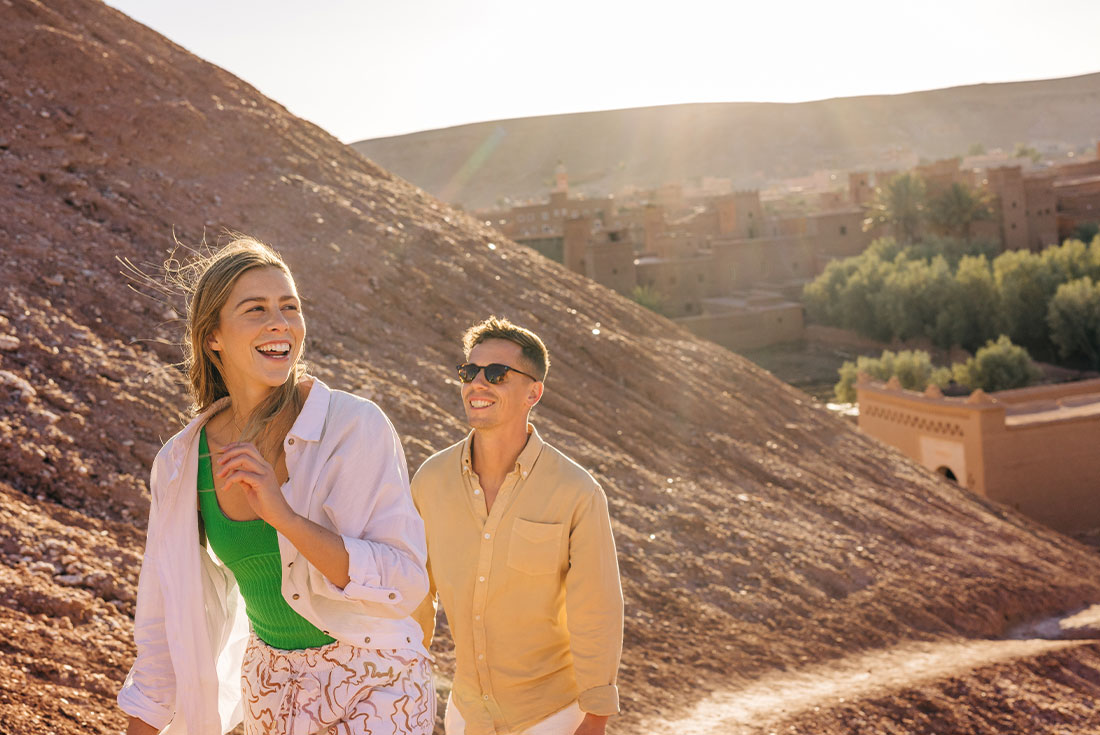
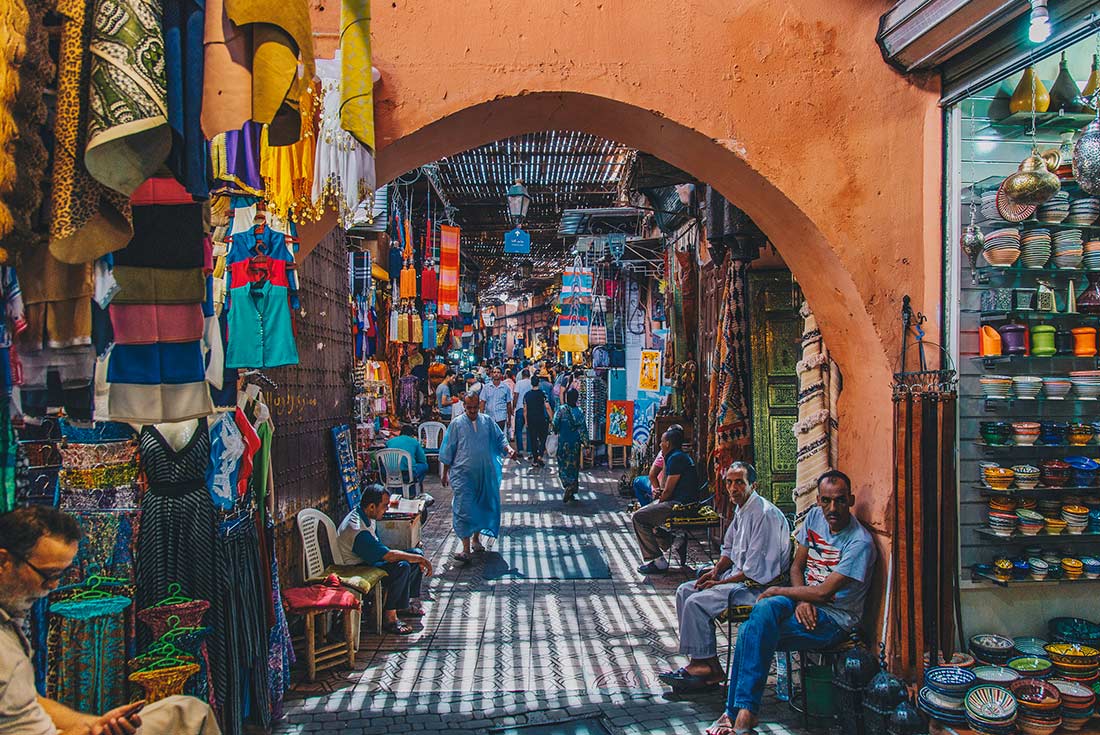
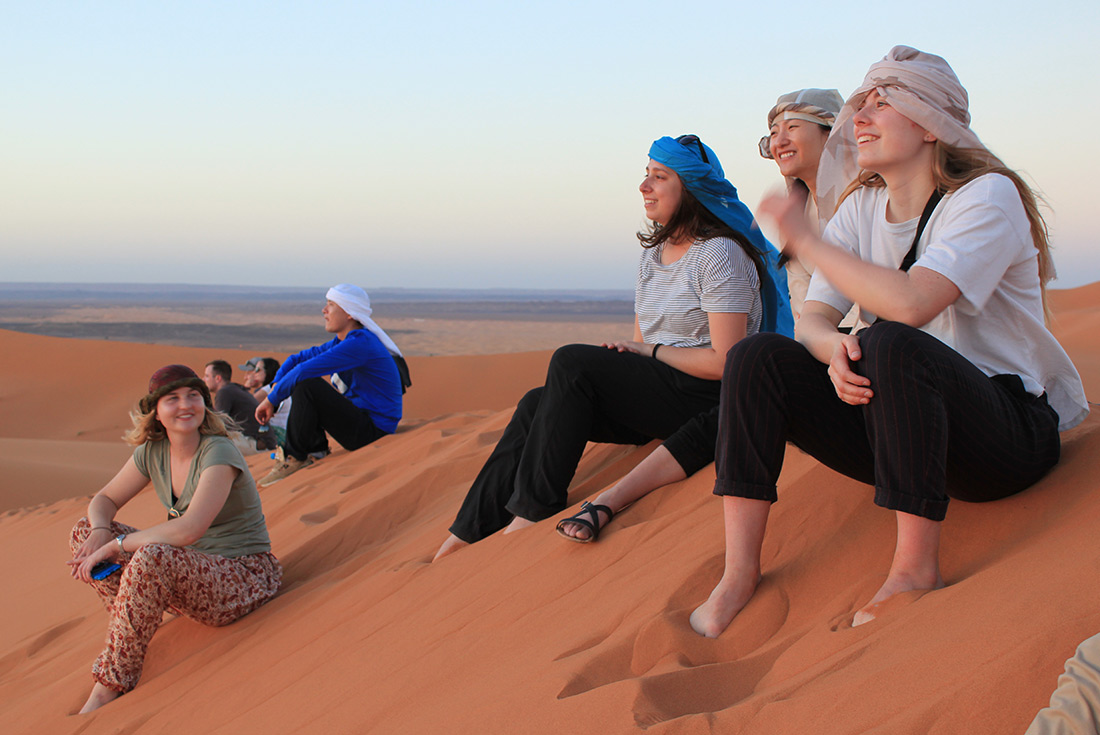
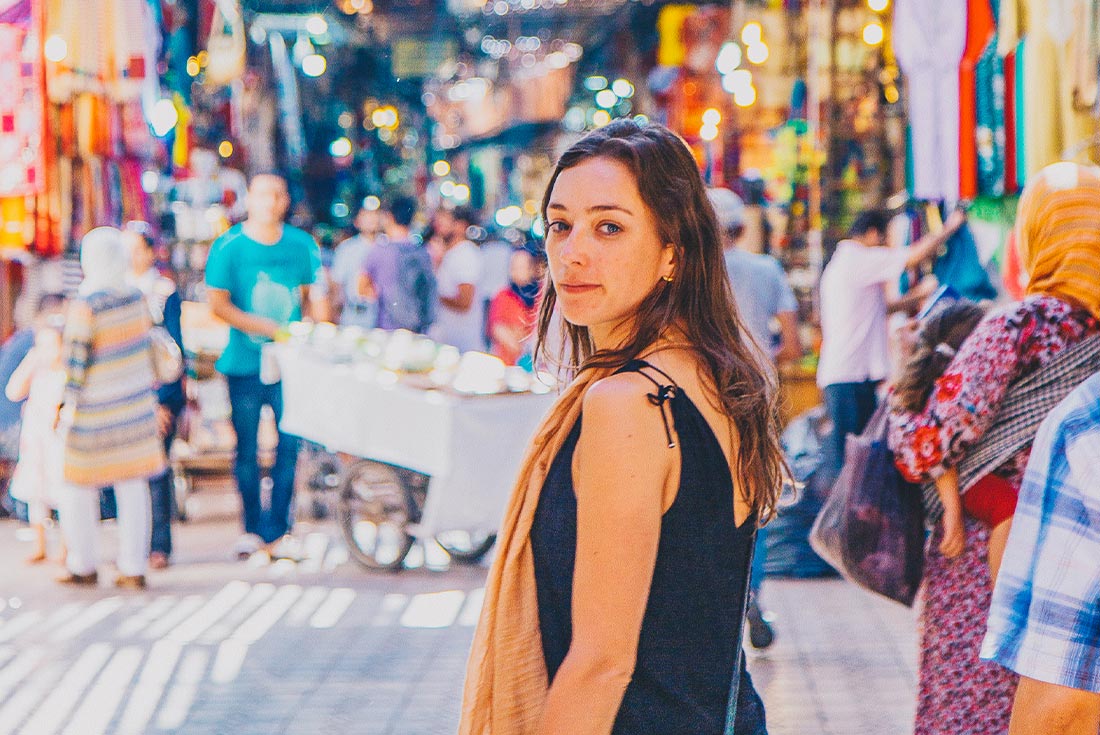
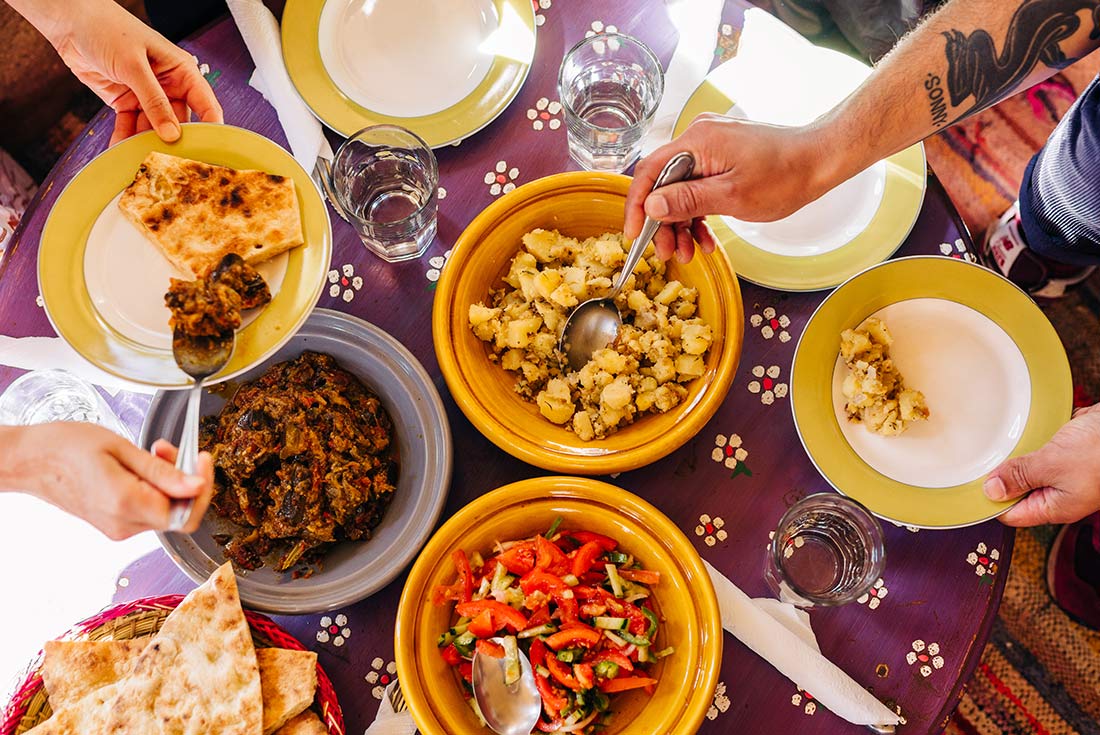
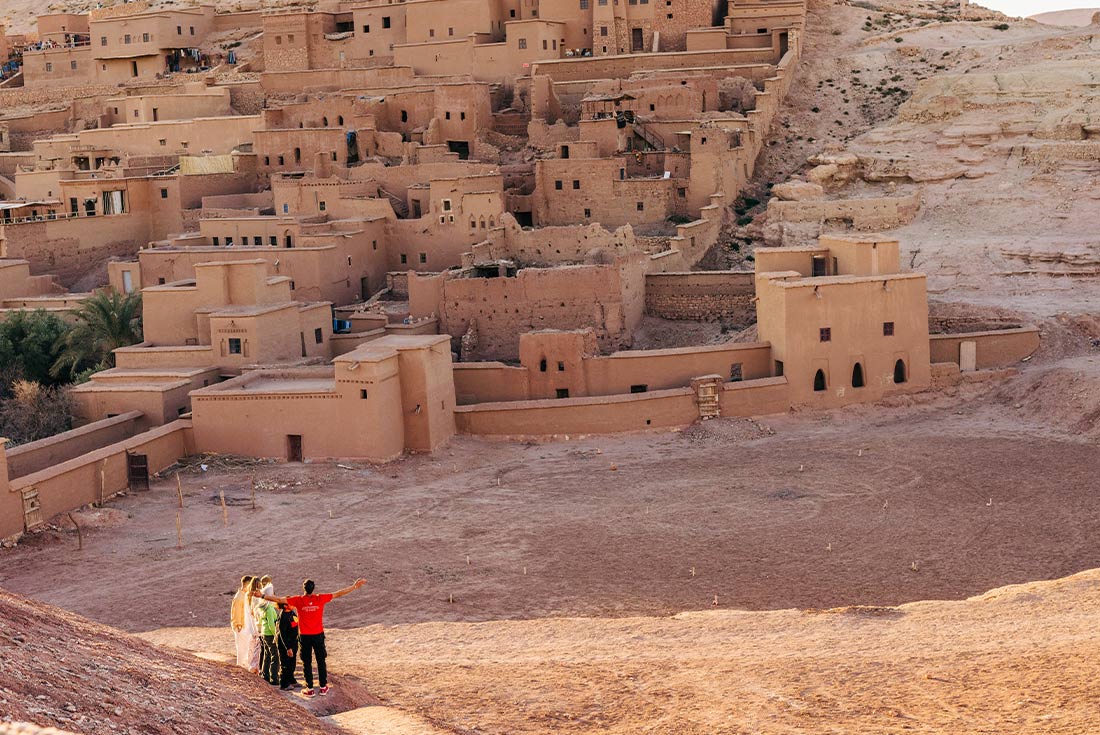
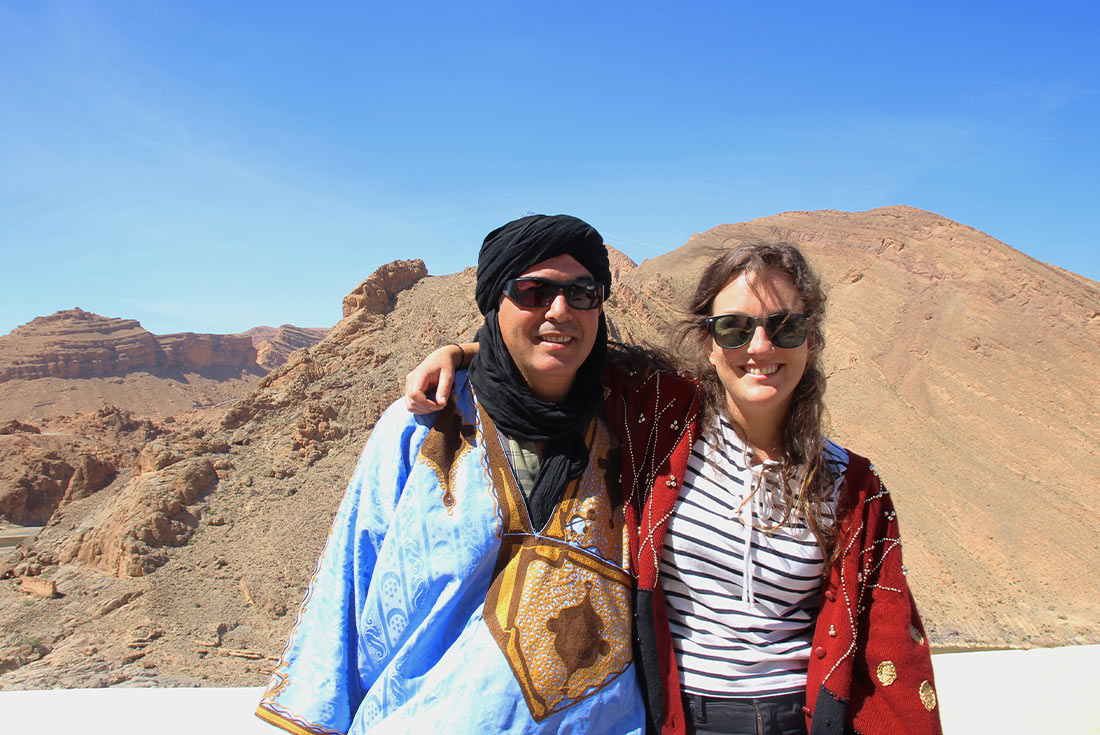
Todra Gorge – Home-cooked Lunch
Sahara Desert - Overnight Desert Camp
Sahara Desert - Camel ride
Ait Benhaddou - Tea at Tawesna association
Imlil – Scenic Walk
Imlil – Day Hike with Picnic Lunch
Hike through rugged terrain and small villages, then take in the view of the valley as you tuck into a home-cooked meal prepared by a local family in Todra Gorge.
Tick the Djemaa el-Fna Square off your bucket list in Marrakech and wander through the amazing chaos of street performers, singers, poets and street food carts all vying for your attention.
Stay the night in a Sahara desert camp, far away from tourist crowds After a camel ride through the sand dunes, watch the sunset with your group.
Prepare for the best mint tea of your life on a visit to the Tawesna teahouse. This experience is more than just a cuppa, it’s about discovering a culture, sharing a true moment with locals and contributing to the economic inclusion of women.
Take a break from the bustling city streets high in the Atlas Mountains – enjoy homecooked meals, authentic local connections and a breath of fresh air at an Aroumd homestay.
Hotel Amalou, 156 Avenue Abdelkrim Khattabi Gueliz, Gueliz, 40 000 Marrakech, Morocco , Marrakech, MOROCCO, Phone: +212 524422356
Hotel Amalou, 156 Avenue Abdelkrim Khattabi Gueliz, Gueliz, 40 000 Marrakech, Morocco , Marrakech, MOROCCO, Phone: +212 524422356
1. A single supplement is available if you’d prefer not to share a room on this trip. The single supplement excludes Day 3 (Desert Camp) and Days 5,6 (Guesthouse) where you will be in shared accommodation and is subject to availability. Please also note that there is a limited amount of single supplements available per trip departure. If you would like to book a single supplement and enquire about availability, please speak to your booking agent for further information.
While we always endeavour to provide the best possible holiday experience, due to the nature of travel and the areas we visit sometimes things can and do go wrong. Should any issue occur while you are on your trip, it is imperative that you discuss this with your group leader or local representative straight away so that they can do their best to rectify the problem and save any potential negative impact on the rest of your trip.
We recognise that there may be times when your group leader or local representative may not be able to resolve a situation to your satisfaction - if this is the case, please ask the group leader or local representative to speak to their direct manager.
You may also choose to provide details in your online feedback, which we ask you to complete within 30 days of the end of your trip. Please do be aware that it is very difficult for us to provide any practical help after the trip is completed, so informing us while still travelling will give us the opportunity to resolve the issue in real-time., For general contact details please use the following page: https://www.intrepidtravel.com/contact-us, In case of a genuine crisis or emergency, you can reach our local office on the numbers below:
, Intrepid's Local Operator: +212 661 922 693
The weather in Morocco can be extreme. Summer temperatures can be uncomfortably hot, especially if you're not used to the heat. If you do travel in the warmer months, bring the necessary sun protection and drink plenty of water. At night the temperature can drop, so bring your warm clothes, too. Camping can be especially cold in winter and near Aroumd you can expect snow at the start and end of the season. , Travelling during Ramadan can be a rewarding cultural experience, however, some regular services may not be available during the daytime, such as restaurants or coffee bars, and occasionally travel can be disrupted by events. Your leader will adjust the itinerary accordingly, but please consider your travel arrangements carefully before booking travel for this period. Refer to the "Climate and seasonal information," section of your Essential Trip Information for more details and dates., Todra Gorge and Aroumd are remote areas of Morocco. They’re best explored on foot, so you’ll need a moderate level of fitness and hiking shoes. You’ll also take only a small bag of essentials with you for your two-night stay in Aroumd. Please see the Packing section of the Essential Trip Information for more details., Although you shouldn’t expect any aggressive selling techniques in Morocco, please be aware that you may be approached regularly by shop owners and street vendors., We've sourced our accommodation carefully and picked the best possible hotels in line with the Intrepid style of travel, but please note that service and accommodation in Morocco may be different from Western standards., This trip is a great way to see a lot in a short period of time and it can be part of a longer itinerary if you have more time to explore. You might like to check out Real Morocco.
Hike through rugged terrain and small villages, then take in the view of the valley as you tuck into a home-cooked meal prepared by a local family in Todra Gorge., Tick the Djemaa el-Fna Square off your bucket list in Marrakech and wander through the amazing chaos of street performers, singers, poets and street food carts all vying for your attention., Stay the night in a Sahara desert camp, far away from tourist crowds After a camel ride through the sand dunes, watch the sunset with your group., Prepare for the best mint tea of your life on a visit to the Tawesna teahouse. This experience is more than just a cuppa, it’s about discovering a culture, sharing a true moment with locals and contributing to the economic inclusion of women., Take a break from the bustling city streets high in the Atlas Mountains – enjoy homecooked meals, authentic local connections and a breath of fresh air at an Aroumd homestay.
All group trips are accompanied by one of our group leader or local representative. The aim of the group leader or local representative is to take the hassle out of your travels and to help you have the best trip possible. Intrepid endeavours to provide the services of an experienced group leader or local representative however, due to the seasonality of travel, rare situations may arise where your group leader or local representative is new to a particular region or training other group leader or local representative.
Your group leader or local representative will provide information on the places you are travelling through, offer suggestions for things to do and see, recommend great local eating venues and introduce you to our local friends. While not being guides in the traditional sense, you can expect them to have a broad general knowledge of the places visited on the trip, including historical, cultural, religious, and social aspects. At Intrepid we aim to support local guides who have specialised knowledge of the regions we visit. If you are interested in delving deeper into the local culture at a specific site or location then your group leader or local representative can recommend a local guide service in most of the main destinations of your trip.
TRAVEL ADVISORIES & ALERTS
We recommend that you check your government's foreign travel advisory for the latest information about the destination before you travel. You will also need to ensure that your travel insurance covers you for all destinations and activities on your trip. We also recommend saving the phone number for emergency consular assistance for your government’s consulate in the destination/s you’ll be travelling. Links to travel advisories and any current travel alerts for our trips can be found here: https://www.intrepidtravel.com/travel-alerts
PERSONAL SAFETY
Ensure you have a secure method of carrying your passport, phone, credit cards and cash while travelling such as a money belt. Leave all other high value items, including jewellery, at home Use safety deposit boxes at hotels to store your valuables when available and ensure your luggage is lockable. Be aware of the risk of pick-pocketing and petty theft. Exercise caution when walking at night, don’t walk alone and stick to well-lit streets wherever possible. Be vigilant on public transport and look out for your fellow travellers. Take precautions such as carrying your bag in front of you and never leaving personal items unattended.
LGBTQIA+ TRAVELLERS
Intrepid welcomes all LGBTQIA+ customers on our trips, however we operate in parts of the world that are less accepting. We support LGBTQIA+ customers to travel to these destinations and are committed to ensuring they face no discrimination on any part of the trip we control. We recommend you visit Equaldex (https://www.equaldex.com/) and your government's foreign travel advice for LGBTQIA+ travellers when choosing your trip., https://www.intrepidtravel.com/safety-guidelines, PETTY THEFT AND PERSONAL SAFETY
While travelling there is always the risk of pick-pocketing and petty theft, particularly in the more touristy cities. We recommend that you exercise caution when walking alone at night and encourage you to walk together and only on main, well-lit thoroughfares. Be particularly vigilant on public transport. Simple measures like carrying your day pack on your front, not hanging your bag over the back of your chair or on the floor and wearing a money belt will reduce any chance that your valuables should go missing., SCAMS:
When walking through touristy areas of cities you may be approached by 'helpful' locals who want to show you where to go or take you to a local spice shop. They will either ask to be your local guide for the day or expect money when you arrive at your destination. Please note these people are not registered guides and will try and get as much money from you as they can. A friendly 'no thank you (or 'la shukran') should suffice.
WOMEN'S SAFETY:
Women should exercise caution when travelling in Morocco. While the risk of an incident occurring on your trip is very low, below are some things you can do for your safety and peace of mind when travelling:
- As with all travel, it’s important to use common sense and be vigilant.
- Respect local dress codes and customs, perhaps dressing more conservatively than you do at home.
- Avoid isolated areas when alone at any time of day.
- Lock your door when you are inside your room. Keep the door locked when you are leaving your room, even for a short time.
- If hotel staff need access to your room for any reason, request that they do this while you are out, or wait at the reception while they attend to any cleaning or repairs. For the protection of both our travellers and staff, our leaders worldwide are not permitted to be alone in a room with a group member.
- Always take a hotel card with you when going out so you know the address and contact numbers.
- Should you encounter any inappropriate behaviour, inform your leader straight away.
- For further information and advice, visit:
https://smartraveller.gov.au/guide/pages/female-travellers.aspx
https://www.gov.uk/government/publications/2010-to-2015-government-policy-british-nationals-overseas/2010-to-2015-government-policy-british-nationals-overseas#appendix-2-advice-for-women-travellers
PETTY THEFT AND PERSONAL SAFETY:
While travelling there is always the risk of pick-pocketing and petty theft, particularly in the more touristy cities. We recommend that you exercise caution when walking alone at night and encourage you to walk together and only on main, well-lit thoroughfares. Be particularly vigilant on public transport. Simple measures like carrying your day pack on your front, not hanging your bag over the back of your chair or on the floor and wearing a money belt will reduce any chance that your valuables should go missing.
FIRE PRECAUTIONS:
Please be aware that local laws governing tourism facilities in this region differ from those in your home country and not all the accommodation which we use has a fire exit, fire extinguishers or smoke alarms.
TRAFFIC AND DRIVING ON THE OTHER SIDE OF THE ROAD:
Depending on where you come from please note that drivers in this part of the world may drive on the opposite side of the road from what you are used to. Look both ways before crossing any road. Traffic can be a little more chaotic than you might be used to at home. Be aware!
PASSPORT
You’ll need a valid passport to travel internationally and most countries require your passport to have a minimum of 6 months validity, so remember to check the expiry date.
We need your passport information to get everything ready for your trip so it’s important that the information on your booking matches your passport exactly. Please take care to provide the correct details. We recommend carrying a copy of the photo page of your passport while travelling and leaving a copy at home with family or friends.
VISAS & ENTRY REQUIREMENTS
Many countries require a visa and obtaining the correct visa for your trip and any countries you may transit through is your responsibility. We recommend you check your visa requirements as soon as you have booked your trip. This will ensure you have time to prepare your documents and for your visa application to be processed. You can check the entry requirements for your nationality on your government's foreign travel advisories, consular websites or on our page here: www.intrepidtravel.com/visa-entry-requirements
Information not available.
Validity: 01 Jan 2026 to 31 Dec 2026
GENERAL HEALTH
All travellers need to be in good physical health in order to participate fully on this trip. For the safety and wellbeing of yourself and others, if you are unwell prior to travelling, please stay at home and contact us to make alternative arrangements.
When selecting your trip please make sure you have read through the itinerary carefully and assess your ability to manage and enjoy our style of travel. Please note that if in the assessment of our group leader or local representative a traveller is unable to complete the itinerary without undue risk to themselves and/or the rest of the group, we reserve the right to exclude them from all or part of a trip without refund.
You should consult your doctor for up-to-date medical travel information or for any necessary vaccinations before departure. We recommend that you carry a first aid kit as well as any personal medical requirements in their original packaging as they may not easily be obtained while travelling. If you are carrying medication, ensure you check your government's foreign travel advice for any local restrictions or requirements.
While travelling with us you'll experience the vast array of wonderful food available in the world. Your group leader or local representative will be able to suggest restaurants to try during your trip. To give you the maximum flexibility in deciding where, what and with whom to eat, generally not all meals are included in the trip price. This also gives you more budgeting flexibility. As a rule, our groups tend to eat together to enable you to taste a larger variety of dishes and enjoy each other's company. If you have dietary requirements and/or food allergies, please let your booking agent know prior to departure., Moroccan food is excellent though not particularly varied. Breakfasts usually consist of bread and jam with coffee or tea. Meals at restaurants are reasonably priced, from MAD 30 to MAD 120, depending on the type of restaurant and what you order.
Please let us know prior to travel if you have any dietary requirements. We always endeavour to cater to specific needs for included meals, but sometimes the options will be limited.
Vegetarians are generally offered couscous, tagines or omelettes. Vegans and those on gluten-free diets should come prepared with snacks to supplement the options available to them.
Alcohol isn’t widely available in Morocco, due to cultural and religious beliefs. Alcohol is available to purchase in some hotels and restaurants, but the prices are high due to importation costs. Please be considerate and respectful of local laws and local people if you choose to drink alcohol.
SPENDING MONEY
When it comes to spending money on the trip, every traveller is a little different. You know your spending habits better than we do, so please budget an appropriate amount for things like optional meals, drinks, shopping, optional activities, and laundry. Make sure you have read the itinerary and inclusions thoroughly so you know what is included in the trip price and what you may need to pay for while travelling. , MOROCCO
The currency of Morocco is the dirham (MAD). ATMs are widely available in all major towns and cities. Credit cards are useful for large purchases such as carpets or ceramics from large stores, but generally they are not widely accepted. Please ensure you only use banks, licensed money exchangers, or hotels. We also suggest you keep your receipts. Do not change money with street touts as this is illegal. Changing money is easy and you will find banks and exchange bureaus in large cities, but they often only accept USD, EUR and GBP. In the desert and Atlas Mountains opportunities to withdraw or exchange money are limited., TIPPING
Tipping can be an appropriate way to recognise great service when travelling. While it may not be customary in your home country, it is an entrenched feature of the tourism industry across many of our destinations and is greatly appreciated by the people who take care of you during your travels. It is always best to avoid tipping with coins, very small denomination notes, or dirty and ripped notes, as this can be regarded as an insult rather than the goodwill gesture it is intended to be., OPTIONAL TIPPING KITTY
On Day 1 of your trip, your group leader or local representative may discuss with you the idea of operating a group tipping kitty, whereby everybody contributes an equal amount and your group leader or local representative distributes tips for drivers, local guides, hotel staff and other services included on your trip. Participation in this kitty is your choice, and you are welcome to manage your own tipping separately if you prefer.
The group leader or local representative will keep a running record of all monies spent, which can be checked at any time. Any funds remaining at the end of the trip will be returned to group members. These tips to suppliers are for great service and are in addition to the regular costs paid for the services supplied.
The tipping kitty excludes tips for your group leader or local representative., Optional tipping kitty for this trip: MAD 450 per person., YOUR GROUP LEADER OR LOCAL REPRESENTATIVE
Tipping your group leader or local representative is highly appreciated if you feel they’ve provided outstanding services throughout your trip. The amount is entirely a personal preference; however, as a guideline, the recommended amount is 4-7 USD or EUR per traveller per day (in a currency relevant to your destination). Of course, you are free to tip more or less as you see fit, depending on your perception of service quality and the length and involvement of your group leader or local representative on your trip., YOUR DRIVERS
You may have a range of drivers on your trip. Some may be with you for a short journey, while others may be with you for several days. We recommend tipping your drivers USD 2 – 4 per person per day (in a currency relevant to your destination)., CONTINGENCY FUNDS
We try to plan for every eventuality, but there are still some things beyond our control. We reserve the right to change an itinerary after departure due to local circumstances or a Force Majeure Event. In such emergency circumstances, the additional cost of any necessary itinerary alterations will be covered by you. Please note we are not responsible for any incidental expenses that may be incurred as a result of the change of itineraries including but not limited to visas, vaccinations or non-refundable flights. Make sure you have access to an extra US$500 for emergencies (e.g. severe weather, natural disasters, civil unrest) or other events that result in unavoidable changes to the itinerary (e.g. transport strikes or cancellations, airport closures). Sometimes these things necessitate last-minute changes to enable our trips to continue to run, and as a result, there may be some extra costs involved. The recommended amount is listed in USD for the relatability of universal travellers, however, local currency may be needed once in the country to cover these costs., COMMISSIONS
Intrepid understands that the receipt of commissions in exchange for recommending particular shops or services is ingrained in the culture of the tourism industry. For this reason, we have established a centralised fund for contributions from recommended suppliers so these can be collected and distributed back into the business. Actively managing the receipt of commissions helps us maintain the level of quality you expect on one of our trips. Travel is always an adventure so Intrepid cannot explicitly guarantee the quality of a product but we aim to provide the best value trips in the market. Please let us know via the feedback form completed after your trip if we are successfully meeting - or exceeding - this objective.
Most travellers prefer to take a small to medium wheeled suitcase, which is a great size for the packing capacity in our private vehicles. Whatever you take, be mindful that you will need to be able to carry your own luggage, handle it at airports, take it in/out of accommodation and perhaps even walk short distances. We recommend you pack as lightly as possible.
If your trip includes travelling on overnight trains or primarily using public transport, the smaller your luggage, the easier it will be to store under or above bunks. Large suitcases may not be able to be taken on board. A lockable bag or small padlock for your bag will be useful, especially when travelling on public transportation as well.
When you're exploring during the day, you'll also need a day pack/bag to carry water, a camera, a jacket and activity-specific items like a swimsuit, a waterproof pouch/bag for your phone, or hiking shoes.
Below we have listed the essentials for this trip:, https://www.intrepidtravel.com/packing-list, AROUMD STAY AND HIKE
During your two-night stay in Aroumd, your main piece of luggage will remain with the vehicle in Imlil and you won’t have access to it. You will need a small bag for your essentials for this two-night stay.
The hiking activities on this trip require hiking shoes as the terrain is rocky and uneven.
, WATER BOTTLE
Please bring your own water bottle to refill. Although it can be difficult to avoid bottled water when travelling, please use the water dispensers which are provided on some of our vehicles and at some of our accommodation. When unable to avoid bottled water, it is better to buy the largest available and distribute it into your smaller bottle for the day. Some travellers like to bring a bottle with its own filtration system or water purification tablets. If you are walking or trekking as part of your trip, you will need to carry at least 2 litres of water with you., SLEEPING BAGS
Please review the weather at the time of year you plan to visit Morocco, particularly the overnight temperatures. If you feel the cold, from November to March you may find the heating and blankets to be insufficient at night. You may like to bring a sleeping bag or thermals to sleep in. Sleeping bags cannot be hired while on the trip and are not easy to buy outside of large cities., DRONES IN MOROCCO
Please note that drones are not permitted to enter or be used in Morocco, neither for personal nor professional/commercial use.
WEATHER IN MOROCCO
As a desert country, Morocco can have extreme weather. Winter (November to March) can be very cold, particularly in the mountains and the desert, with overnight temperatures dropping to 5 degrees Celsius or below. Even in summer the desert gets cold at night. It is recommended to bring a sleeping bag, thermals, a scarf, gloves and a warm jacket for travel in winter. Please be prepared for cold showers.
Summer (May to September) can be very hot everywhere, which means that it can be quite uncomfortable for those not used to the heat. It’s important to use sun protection and drink plenty of water.
Some of our guesthouses/hotels are unable to supply heating or air conditioning as this would be a major financial and environmental strain. It is also a case of energy supply and timing provisions, which are limited in some places., EID AL-ADHA
Eid Al-Adha (Sacrifice Feast) will take place in Morocco on 26 – 27 May 2026. This festival honours the sacrifice Abraham made of his own son. In commemoration of this, an animal is sacrificed and divided into three parts: one-third of the share is given to the poor and needy; another third is given to relatives, friends and neighbours; and the remaining third is retained by the family. Please expect delays or complete suspension of public services during that time which may be disruptive to the trip schedule. For some, it may also be disturbing to see animals being sacrificed, as this can take place in public., RAMADAN
The important month of Ramadan is expected to be in progress 16 February to 18 March 2026 and the Eid ul-Fitr festival will be held directly at its conclusion for 3-4 days. Ramadan is a festival of sacrifice where the devout refrain from eating or drinking during daylight hours. During Ramadan, business hours are shortened, including opening hours at some tourist attractions. Alcohol is not permitted during daylight hours and many restaurants will be closed. While you should expect some delays and inconveniences during this period, the month is a fantastic opportunity to travel in a Muslim country and witness this unique period, particularly the nightly celebrations when the sun sets and the fast is broken. Please note that although the Eid ul-Fitr festival can also be a fascinating time to travel it's a period of national holiday. Most government offices and businesses will be closed and some tourist site opening hours may be affected.
Intrepid won't tolerate any kind of violence, harassment (whether physical, verbal or sexual), or disrespect toward fellow travellers, our teams or local communities.
To ensure the wellbeing of everyone on the trip, decisions made by your group leader are final.
Romantic relationships between travellers and group leader or local representative are not permitted while on trip.
Any behaviour that prevents your leader from continuing the itinerary as planned, breaks local laws or opposes any of these guidelines may result in Intrepid denying your booking or removing you from the trip.
If something concerns you during your travels, please speak to your group leader immediately. Alternatively, you can contact us on the emergency contact number detailed in the Problems and Emergency Contact Information section of this Essential Trip Information.
The style of accommodation indicated in the day-to-day itinerary is a guideline only and may change. On some occasions, alternative arrangements may need to be made due to the lack of availability of rooms in our preferred accommodation. In these cases, we will use a similar standard of accommodation.
Throughout the trip, we request that our properties prepare rooms in time for our arrival, especially if we're arriving prior to normal check-in time. However, this isn't always possible which means we won't be able to check-in immediately on arrival at some hotels. Instead, we can store our luggage and explore our new destination or on some trips, have use of shared day rooms until all rooms are available.
, We've sourced our accommodation very carefully and picked the best possible hotels or hostels in line with the Intrepid style of travel. Yes, we do cool, mostly central and often very original accommodation in Morocco, but remember, occasionally we are not in the right centre of action, which means you may need to hop on a public transport to get to the city centre (or grab a lovely old Merc taxi – plenty of them around). Please note that service and accommodation in Morocco is not quite the same standard you are used to. Your accommodation will not always have private en suite facilities or air-conditioning. In fact, on Intrepid trips you may sometimes share your room with more than one person. But that certainly isn’t the rule.
OCCASIONAL ALTERNATIVE ACCOMMODATION
The style of accommodation indicated in the day-to-day itinerary is a guideline. On rare occasions, alternative arrangements may need to be made due to the lack of availability of rooms in our usual accommodation. A similar standard of accommodation will be used in these instances.
TWIN SHARE / MULTI SHARE BASIS
Accommodation on this trip is on a twin/multishare basis. Please note there may be times where facilities will be shared rather than ensuite.
HEATING
Some of our guesthouses/hotels are unable to supply heating as this would be a major financial and environmental strain. It's also a case of energy supply and timing provisions, which is limited in some places. Please be prepared for cold showers, which are a pleasure for most of the year. Air-conditioning systems (if available) don't always function.
CHECK-IN TIME
Throughout the trip we request that our hotels prepare rooms in time for our arrival, especially if we're arriving prior to normal check-in time. However this isn't always possible which means we won't be able to check-in immediately on arrival at some hotels. Instead, we can store our luggage and explore our new destination.
PRE/POST TRIP ACCOMMODATION
If you've purchased pre-trip or post-trip accommodation (if available), you may be required to change rooms from your trip accommodation for these extra nights.
There are some long travel days and some rough travelling in areas away from the main tourist routes. High passes, windy roads, and rough surfaces make for some challenging travel experiences. On some long travel days, we depart early in the morning to ensure we optimise our time at our next destination. If you experience travel sickness we recommend you consider medication to help ease the discomfort. The best part about all of these long drives is the spectacular views and fun stops en route such as mountain passes, kasbahs, palmeries, sand dunes, goats up trees, etc.
We also use public transport on some of our trips around Morocco. Be it a train or a public bus, remember that the best part of it is the possibility to interact with local people traveling along with you.
Travel insurance is compulsory on all our trips for those travelling internationally. We require that, at a minimum, you are covered for medical expenses, including emergency repatriation. If you are travelling within your home country or region, please confirm before travel that you are entitled to access the public medical system easily should an accident occur. We strongly recommend all travellers have a policy that also covers personal liability, cancellation, curtailment and loss of luggage or personal effects. For international trips, you will not be permitted to join the group until evidence of travel insurance and the insurance company's 24-hour emergency contact number has been sighted by your group leader or local representative.
If you have credit card insurance, your group leader or local representative will require details of the participating insurer/underwriter, the level of coverage, policy number, and emergency contact number, rather than the bank's name and your credit card details. Please contact your bank for these details prior to arriving in-country.
For travellers who reside within the European Union, Switzerland or the USA, the requirement to purchase travel insurance cannot be compulsory. However, the purchase of travel insurance is still highly recommended, and each country you visit may have its own specific entry requirements. For example, some mandate travel health insurance for all foreign travellers, regardless of their nationality. Travellers from the European Union, Switzerland or the USA who decline travel insurance when travelling outside their home region must sign a Travel Insurance Waiver Form at the Group Meeting, recognizing personal responsibility for emergency medical and repatriation costs should they arise.
For assistance with travel insurance or other services, please visit the link below:
, https://www.intrepidtravel.com/booking-resources/our-services
As you travel on a group trip you will be exposed to all the pleasures and maybe some of the frustrations of travelling in a group. Your fellow travellers will probably come from all corners of the world and likely a range of age groups too. We ask you to be understanding of the various needs and preferences of your group - patience with your fellow travellers is sometimes required for the benefit of everyone's travel experience. Remember too that you have responsibilities to the group. If you are requested to be at a place at a certain time, ensure that you don't keep the rest of the group waiting. We have found time and time again that the very best trips we operate are those where the dynamics within the group work well - this takes just a little effort on your part. Due to privacy reasons, we are unable to provide you with contact details and any personal information about your fellow travellers booked on your trip prior to departure., SOLO TRAVELLERS
On our trips, rooming is organised on a twin-share basis. We pair up solo travellers with another traveller of the same gender, as per the gender marker on each of their passports.
We also offer an optional single supplement on most trips for travellers who prefer to have their own room. This only applies to accommodation during the tour. Pre-trip and post-trip accommodation booked through us will always be on a single-room basis.
On a small selection of trips some accommodation will be open-gender and multishare, such as a felucca in Egypt or an overnight train in Vietnam. Please review the Accommodation section of the Essential Trip Information for details about your trip.
LGBTQIA+ TRAVELLERS
We strive to create a safe and inclusive environment for everyone. If your gender identity differs from what is indicated on your passport, please contact us so that we can discuss rooming options with you.
ITINERARY CHANGES
Our itineraries are updated regularly throughout the year based on customer feedback and to reflect the current situation in each destination. The information included in this Essential Trip Information may therefore differ from when you first booked your trip. It's important that you review this information prior to travel so that you have the latest updates. Due to weather, local conditions, transport schedules, public holidays, political unrest or other factors, further changes may be necessary to your itinerary once in-country. Your group leader or local representative will keep you up to date with any such changes once your trip is underway and has the authority to amend or cancel any part of the trip itinerary if deemed necessary due to safety concerns.
, OPTIONAL ACTIVITIES
A selection of optional activities that have been popular with past travellers are listed in the day-to-day itinerary. This isn't an exhaustive list and should be used as a guide only for some of what might be available. Prices are approximate, are for entrance fees only, and don’t include transport to and from the sites or local guides unless indicated. All activities are subject to availability, and maybe on a join-in basis. It may not be possible to do all the activities listed in the time available at each destination, so some pre-planning for what you are most interested in is advised. When it's recommended that travellers pre-book these activities, look for a note in the Special Information section of the day-to-day itinerary. For most, they can either be organised independently on the day, or let your group leader or local representative know you are interested at the Welcome Meeting and they can assist.
Where activities are considered medium or high risk, we work with operators whose safety and credentials we have sighted and assessed. Although it is possible that you may find the same activity cheaper with another operator on the ground, we cannot vouch for the safety or quality of that operator. Medium and high-risk activities not listed above have not been assessed by us and as such our staff and group leader or local representative are unable to assist you with organising these activities. Activities that contravene our Responsible Travel policies are also not listed. Please remember that the decision to partake in any activity not listed is at your own discretion and risk.